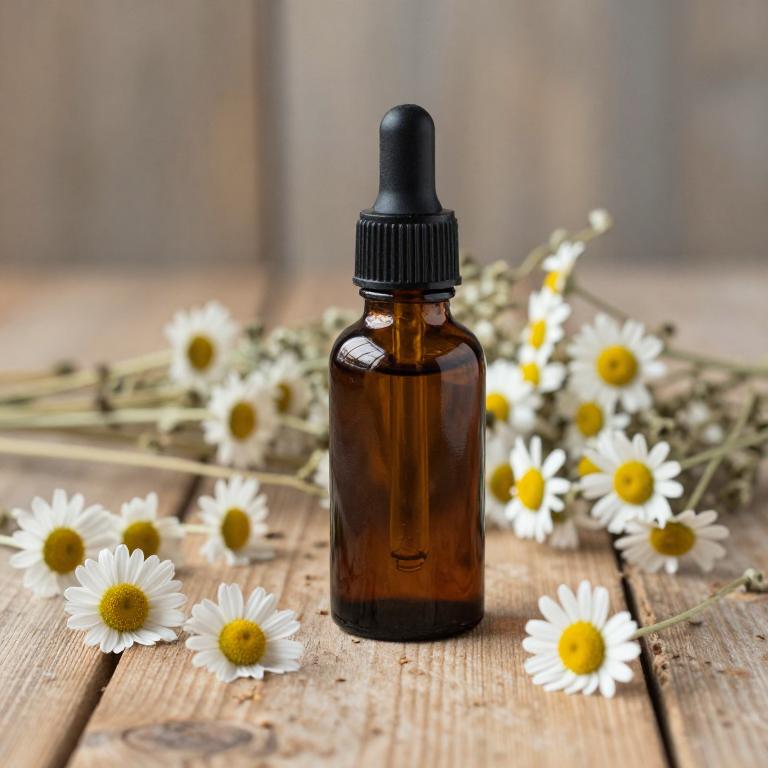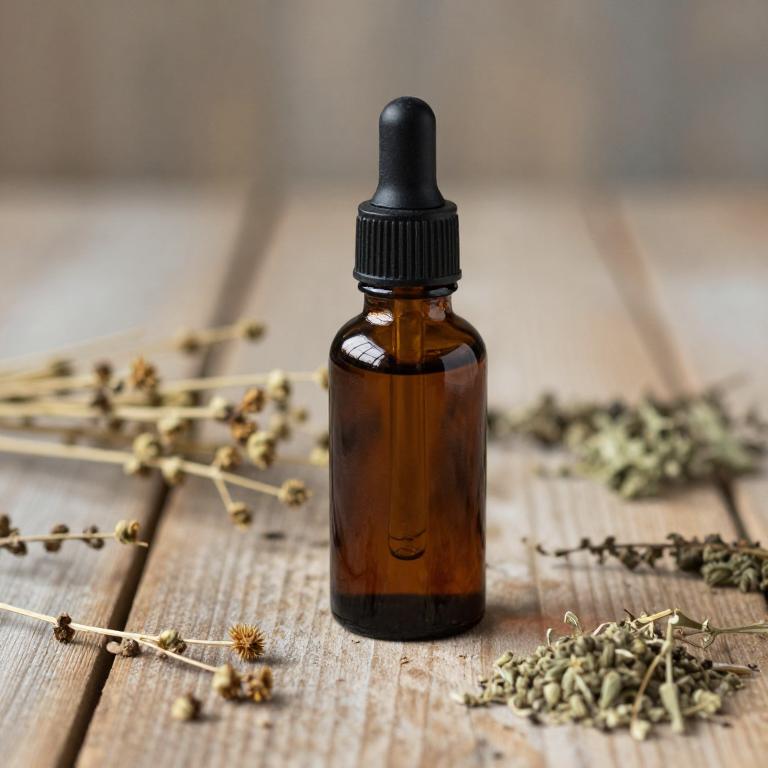10 Best Herbal Tinctures For Gastritis

Herbal tinctures have gained popularity as a natural remedy for managing gastritis, a condition characterized by inflammation of the stomach lining.
These tinctures typically contain a blend of herbs such as licorice root, ginger, chamomile, and marshmallow root, which are known for their soothing and anti-inflammatory properties. They work by reducing stomach acid production, calming the digestive tract, and promoting the healing of the stomach lining. Many individuals prefer herbal tinctures over conventional medications due to their fewer side effects and holistic approach to health.
However, it is important to consult with a healthcare professional before using these tinctures, especially if you are taking other medications or have underlying health conditions.
Table of Contents
- 1. Chamomile (Matricaria chamomilla)
- 2. Ginger (Zingiber officinale)
- 3. Turmeric (Curcuma longa)
- 4. Thistle (Silybum marianum)
- 5. Licorice (Glycyrrhiza glabra)
- 6. Fennel (Foeniculum vulgare)
- 7. Cumin (Cuminum cyminum)
- 8. Stinging nettle (Urtica dioica)
- 9. Dog rose (Rosa canina)
- 10. Yarrow (Achillea millefolium)
1. Chamomile (Matricaria chamomilla)

Matricaria chamomilla, commonly known as chamomile, is often used in herbal tinctures to support digestive health, including the management of gastritis.
The tincture is prepared by extracting the active compounds from dried chamomile flowers using alcohol, which helps preserve and concentrate its therapeutic properties. Chamomile tinctures are valued for their anti-inflammatory and antispasmodic effects, which can help reduce stomach inflammation and soothe gastrointestinal discomfort. They may also promote the secretion of digestive enzymes, aiding in better digestion and reducing symptoms like bloating and indigestion.
However, individuals with allergies to plants in the daisy family should use chamomile tinctures with caution.
2. Ginger (Zingiber officinale)

Zingiber officinale, commonly known as ginger, has been widely used in herbal medicine for its anti-inflammatory and digestive properties, making it a popular choice for managing gastritis.
Ginger tinctures, which are concentrated liquid extracts of the root, can help soothe the stomach lining and reduce inflammation in the gastrointestinal tract. These tinctures work by inhibiting the production of stomach acid and promoting the healing of ulcers and irritation. They are often recommended as a natural alternative or complement to conventional treatments for gastritis.
However, it is important to consult a healthcare professional before using ginger tinctures, especially for individuals with existing medical conditions or those taking other medications.
3. Turmeric (Curcuma longa)

Curcuma longa, commonly known as turmeric, has been traditionally used for its anti-inflammatory and antioxidant properties, making it a popular choice for herbal tinctures aimed at alleviating symptoms of gastritis.
These tinctures typically contain curcumin, the active compound in turmeric, which helps reduce inflammation in the stomach lining and may protect against gastric ulcers. When used as a complementary therapy, curcuma longa tinctures can support the healing process by neutralizing free radicals and promoting digestive health. However, it is important to consult with a healthcare provider before using these tinctures, as they may interact with certain medications or exacerbate conditions in some individuals.
Overall, curcuma longa herbal tinctures offer a natural and potentially effective option for managing gastritis when used appropriately.
4. Thistle (Silybum marianum)

Silybum marianum, also known as milk thistle, is a herbal remedy commonly used in the form of a tincture to support liver health and may benefit individuals with gastritis by promoting digestive wellness.
The active compound, silymarin, is believed to have anti-inflammatory and antioxidant properties that can help reduce irritation in the stomach lining. While not a cure for gastritis, silybum marianum tinctures may aid in protecting the stomach from damage caused by excess acid or harmful substances. It is often recommended as a complementary therapy alongside conventional treatments for gastritis.
However, it is important to consult with a healthcare provider before using this herb, especially if you are taking other medications or have underlying health conditions.
5. Licorice (Glycyrrhiza glabra)

Glycyrrhiza glabra, commonly known as licorice root, has been traditionally used in herbal medicine for its anti-inflammatory and soothing properties, making it a popular choice for managing gastritis.
When prepared as a tincture, glycyrrhiza glabra can help reduce inflammation in the stomach lining and alleviate symptoms such as heartburn, indigestion, and nausea. The active compounds, including glycyrrhizin and flavonoids, contribute to its ability to protect the gastric mucosa and modulate digestive secretions. However, long-term use of licorice tinctures may lead to side effects such as hypertension or fluid retention due to its mineralocorticoid-like effects.
As a result, it is often recommended to use licorice root tinctures under the guidance of a qualified herbalist or healthcare provider to ensure safe and effective treatment for gastritis.
6. Fennel (Foeniculum vulgare)

Foeniculum vulgare, commonly known as fennel, is a herb widely used in traditional medicine for its digestive benefits, including the treatment of gastritis.
Fennel tinctures are concentrated herbal extracts that harness the plant’s essential oils, which contain compounds like anethol and fenchone, known for their anti-inflammatory and antispasmodic properties. These tinctures can help soothe the stomach lining, reduce inflammation, and alleviate symptoms such as bloating and indigestion associated with gastritis. When used as a complementary therapy, fennel tinctures may support overall digestive health and promote healing in the gastrointestinal tract.
However, it is important to consult a healthcare professional before using fennel tinctures, especially for individuals with chronic gastritis or other underlying health conditions.
7. Cumin (Cuminum cyminum)

Cuminum cyminum, commonly known as cumin, has been traditionally used in herbal medicine for its potential therapeutic effects on digestive health.
Cumin seed tinctures are often prepared by soaking the dried seeds in alcohol to extract their active compounds, which include essential oils and phytochemicals with anti-inflammatory and carminative properties. These tinctures may help alleviate symptoms of gastritis by reducing inflammation in the stomach lining and promoting healthy digestion. Some studies suggest that cumin can stimulate the production of digestive enzymes and protect the gastrointestinal tract from harmful substances.
However, it is important to consult a healthcare professional before using cumin tinctures, especially for individuals with pre-existing medical conditions or those taking medications.
8. Stinging nettle (Urtica dioica)

Urtica dioica, commonly known as stinging nettle, has been traditionally used in herbal medicine for its anti-inflammatory and digestive properties.
When prepared as a tincture, Urtica dioica can support the digestive system by reducing inflammation in the stomach lining, making it a potential remedy for gastritis. The tincture is typically made by soaking the dried leaves in alcohol, allowing the active compounds to be extracted for easier absorption. It is often recommended to take the tincture in small doses with meals to help soothe irritation and promote healthy digestion.
However, it is important to consult with a healthcare professional before using Urtica dioica tincture, especially for individuals with existing health conditions or those taking other medications.
9. Dog rose (Rosa canina)

Rosa canina, commonly known as rosehip, has been traditionally used in herbal medicine for its anti-inflammatory and antioxidant properties, making it a popular choice for supporting digestive health.
Rosa canina herbal tinctures are often recommended for individuals suffering from gastritis due to their ability to soothe the lining of the stomach and reduce irritation. These tinctures contain high levels of vitamin C, bioflavonoids, and essential fatty acids, which help to combat oxidative stress and promote healing of the gastrointestinal tract. When taken regularly, rosehip tinctures may help alleviate symptoms such as bloating, indigestion, and abdominal discomfort associated with gastritis.
As with any herbal remedy, it is advisable to consult a healthcare professional before incorporating rosa canina tinctures into a treatment plan for gastritis.
10. Yarrow (Achillea millefolium)

Achillea millefolium, commonly known as yarrow, has been traditionally used in herbal medicine for its anti-inflammatory and digestive properties, making it a potential candidate for supporting individuals with gastritis.
When prepared as a tincture, yarrow can be taken orally to help soothe the stomach lining and reduce inflammation in the gastrointestinal tract. The active compounds in yarrow, such as flavonoids and essential oils, may aid in alleviating symptoms like heartburn, bloating, and indigestion associated with gastritis. However, it is important to consult with a healthcare professional before using yarrow tinctures, as they may interact with certain medications or have side effects in some individuals.
While not a substitute for medical treatment, yarrow tinctures may offer a complementary natural approach to managing gastritis symptoms.